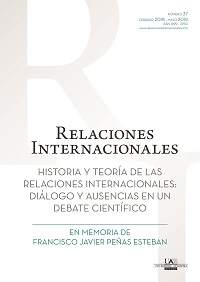Explain, value, understand and influence: around the "performance" of the historian in the History of International Relations / Interviews with various authors
Copyright (c) 2018 Francisco Javier PEÑAS ESTEBAN

This work is licensed under a Creative Commons Attribution-NonCommercial-NoDerivatives 4.0 International License.
Abstract
In the discussions that the coordinators held to prepare this issue 37 of the Journal of International Relations, problems arose that affected History, others that affected the Theory of International Relations, and others which effects covered all social and political theory. Discussions about deep forces, event/occurrence, and the relative influence of both; on narrating from the present, but contextualizing the acts and discourses of the protagonists in their place in time and space; among others.
One of these discussions —often dilemmatic— concerned responsibility and (moral) guilt in History; another recurring discussion was the role of the historian at a time when even the stalest media use terms like narratives.
Certainly, discourses, narratives and stories create reality and identity, and it is not lost on anyone that, today, making a narrative hegemonic is a first-rate political triumph.
But, although many people feel authorized to pronounce on History —and History itself— in a gathering or in a newspaper column, the works of professionals are, at least, the reference —of what is not simply invented. And therein lies our responsibility as scholars and academics.
As we were clear that we would not resolve the issues —even some of them have no solution— we decided to ask fellow historians and international relations about these latter concerns.





